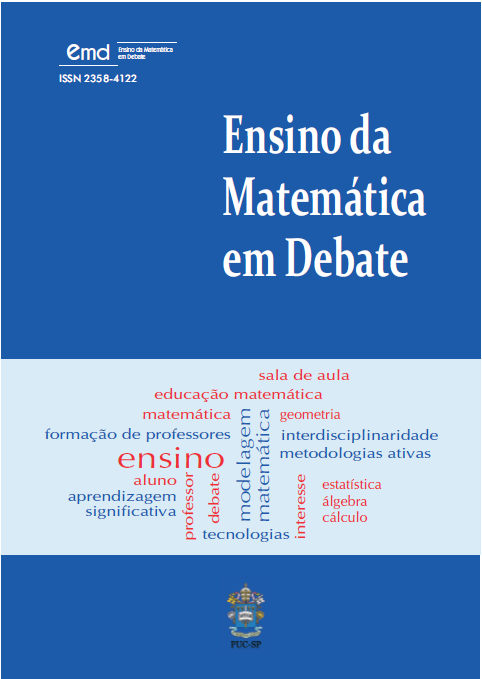The soap powder box: analysis of the potential of a learning situation
Keywords:
Guiding Teaching Activity, Learning Trigger Situation, Area and volume of solidsAbstract
The concern that generated this study is related to the way of recognizing the potential of a situation developed within the assumptions of the Teaching Guiding Activity to trigger the students' activity. Our goal is to present and analyze the potential of a situation that triggers learning using packaging to teach the concepts of area and volume. The proposal is theoretically supported by Cultural-Historical Theory, Activity Theory, and Guided Teaching Activity. As a procedure to analyze the situation presented, we used the analysis framework developed by Panossian et al. (2020) that articulates the conceptual, cognitive, and instructional aspects of Didactic Analysis from the principles of dialectical pairs present in the theoretical and methodological basis of the Teaching Guiding Activity. In analyzing the situation, the elements of the Guiding Teaching Activity are made explicit: need, motive, actions, and operations, as well as the conceptual aspects in the historical-logical movement of the concept; cognitive aspects linked to the mobilization of theoretical thinking in overcoming the empirical forms of generalization of reality, and finally instructional aspects, in which the actions of the teaching activity and the expectations in relation to the learning actions are made explicit. The analysis of the proposed organization of teaching through the situation of the soap powder box shows its potential to trigger student learning and contribute to the appropriation of theoretical knowledge of area and volume.
References
BOYER, C. B. História da matemática. Trad. Elza F. Gomide. São Paulo: Edgard Blucher.1991
DAVYDOV, V. V. La actividad de estúdio en la edad escolar inicial. In: DAVYDOV, V.V. La ensenãnza escolar y el desarrollo psíquico: Investigación psicológica, teórica y experimental. Trad. Marta Shuare. Moscou: Editorial Progreso. 1988, p. 158-191.
EVES, H. Introdução à história da matemática. Trad. Hygino H. Domingues. Campinas: Editora da Unicamp. 2004
KOPNIN, P. V. A Dialética como Lógica e Teoria do Conhecimento. Rio de Janeiro: Civilização Brasileira. 1978
LEONTIEV, A. N. Actividad, Conciencia y Personalidad. Buenos Aires: Ediciones Ciencias del Hombre. 1978
LEONTIEV, A. N. O Desenvolvimento do Psiquismo. 2.ed. São Paulo: Centauro. 2004.
MORAES, S. P. G. Avaliação do processo de ensino e aprendizagem em matemática: contribuições da teoria histórico-cultural. Tese (Doutorado em Educação) - Universidade de São Paulo). São Paulo, 2008.
MOURA, M. O. de. A atividade de ensino como unidade formadora. Bolema, v.2, n.12, 1996.
MOURA, M. O. de.; LANNER DE MOURA, A. R. Escola: um espaço cultural. Matemática na educação infantil: conhecer, (re)criar - um modo de lidar com as dimensões do mundo. São Paulo: Diadema/SECEL.1998
MOURA, M. O. De. (2016). A Atividade Orientadora de Ensino como Unidade entre Ensino e Aprendizagem. In: Moura, M. O. de. (Org.). A Atividade pedagógica na teoria histórico-cultural. Campinas: Autores Associados, 2016, p.93-125.
NASCIMENTO, C. P.; MOURA, M. O. de. Dos princípios às ações organizadoras da atividade pedagógica. In: PEDERIVA, P. L. M. et al (org). Educar na perspectiva histórico-cultural: diálogos vigotskianos. Campinas: Mercado de Letras, 2018, p. 53-
PANOSSIAN, M. L., & Tocha, N. N. (org.) Estabelecendo Parâmetros de Análise de Situações de Ensino de Conteúdo Matemático: aproximações a partir da Atividade Orientadora de Ensino. Curitiba, UTFPR. 2020
QUINTANILHA, L. O valor de uma ideia simples. Guia Exame de Sustentabilidade, v.41, n. 23, 2007.
ROMERO, L. R. El método del Análisis Didáctico. Revista Iberoamericana de Educación Matemática. v.1, n.33, 2013
ROSENTAL, M. M. e STRAKS, F. M. Categorias del Materialismo Dialéctico. México: Grijalbo, 1960.
RUBTSOV, V. A atividade de aprendizado e os problemas referentes à formação do pensamento teórico dos escolares. In: Garnier, C. BEDNARZ, N.; ULANOVXKAYA, I. (Org.). Após Vygotsky e Piaget: perspectivas social e construtivista escolas russa e ocidental. Porto Alegre: Artes Médicas. 1996
SOUSA, M. do C. de. O movimento lógico-histórico enquanto perspectiva didática para o ensino de matemática. Obutchénie: Revista de didática e psicologia pedagógica, v.1, n.4, 2018.
VIGOTSKY, L. S. A formação social da mente. Trad. Neto, J. C. et al. São Paulo: Martins Fontes.1998
VIGOTSKI, L. S. A construção do pensamento e da linguagem. Trad. Paulo Bezerra. São Paulo, Martins Fontes. 2001.
VIRGENS, W.P. das. Problemas Desencadeadores de Aprendizagem na organização do ensino: sentidos em movimento na formação de professores de matemática. Tese (Doutorado em Educação) - Universidade de São Paulo). São Paulo, 2019.
Downloads
Published
How to Cite
Issue
Section
License
Copyright (c) 2023 Ensino da Matemática em Debate

This work is licensed under a Creative Commons Attribution-NonCommercial 4.0 International License.

Este obra está licenciado com uma Licença Creative Commons Atribuição 4.0 Internacional.






